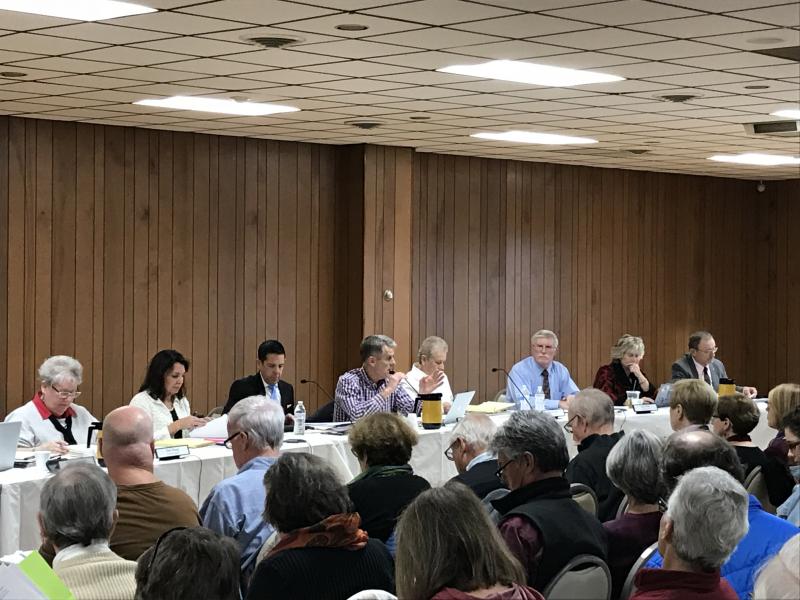Rehoboth gears up for more voting-rights debates

With a measure that would have given owners of property in limited liability companies the right to vote set to be tabled, the Rehoboth Beach commissioners will begin work on a new set of potential charter changes related to voting rights.
The commissioners plan to discuss three measures as part of a package of changes to the charter: term limits for commissioners, rules for voting in referendum elections, and the selection of new commissioners to fill an unexpired term. The commissioners plan to begin debate on the changes at their January workshop meeting.
The package includes measures that were already proposed: eliminating purging of voter rolls if a voter does not vote in two consecutive elections and changing the requirement for voter eligibility from six months to 30 days.
Mayor Paul Kuhns said the commissioners will take a vote Friday, Dec. 15, to table the LLC voting provision and combine voter purging and eligibility requirements with other measures. He said a single package of changes will be presented to the General Assembly, which approves municipal charter changes. The provision over LLCs was tabled in response to a town hall meeting where speakers and written correspondence were overwhelmingly opposed to the measure.
Kuhns proposed term limits at the Dec. 4 commissioner workshop after the commissioners decided to table the LLC provision.
“Over the years, we’ve heard a lot about term limits. We’ll open it up for discussion. It’s probably something worth thinking about,” Kuhns said.
One question regarding the LLC provision was whether commercial businesses, like a restaurant or retail store, would be able to vote if the business was owned in an LLC with someone owning a 50 percent stake.
City Solicitor Glenn Mandalas said yes, they would, although he added that many businesses in town would not make the cut because they are owned by more than two people in an LLC, so they would not meet the 50 percent threshold.
Kuhns questioned whether the LLC provision would have allowed commercial business owners who live out of town to vote, but said such a person could vote now if they have a 10-year lease.
“If an LLC person owns a property, they could write themselves a 10-year lease and vote,” Kuhns said. “This was really an opportunity for mom-and-pop partners who owned a house to vote, just like their neighbors do.”
As the city moves forward on charter changes, other commissioners have their own priorities.
Commissioner Stan Mills has championed a new process for filling unexpired commissioner terms. After Kuhns was sworn in as mayor in September, he nominated former Commissioner Pat Coluzzi to fill the remaining year on his term as commissioner. The choice was protested by Mills and Commissioners Patrick Gossett and Toni Sharp, who twice voted against the selection. Eventually, Kuhns nominated Jay Lagree, who won approval.
Mills said the charter currently states the commissioners shall fill vacancies, but there is no process for nominations or for evaluating nominees. He said the existing process – with no public comment and no special election – gives the voters no voice.
“I lean toward a model that allows for the voters to speak up, via special election, depending on how many months are left in the unexpired term. I look forward to initiating discussion and hearing others’ perspectives,” he said..
Commissioner Lisa Schlosser said the commissioners should eliminate purging voter rolls and change the residency requirements from six months to 30 days to bring the city in line with state law.
She said she looks forward to a discussion on term limits, but Schlosser and Commissioner Kathy McGuiness said they want to ensure the concept of “one person, one vote,” whether in a general election or in a referendum. In 2015, controversy arose over the ocean outfall referendum, when it was discovered that the charter allowed people to vote as residents and as a proxy if they owned property in an artificial entity, such as an LLC.
Commissioner Jay Lagree said he was concerned about how the city would defend nonresident voting, after a number of people at the Dec. 2 town hall said the city would face a constitutional challenge over LLC voting. Lagree questioned whether a legal challenge over LLCs would bleed into the city allowing nonresident voting.
Mandalas said nonresident voting has been challenged legally in other places, but it has been upheld when a municipality can show that nonresidents have a personal stake in the operation of government. Rehoboth, and other Delaware beach towns, not only allow nonresident voting but allow nonresidents to serve as commissioners.
Rehoboth Beach has had nonresident voting since at least 1937. A version of the charter from that year reads that any person above the age of 21 that has been a freeholder for three months would have a vote whether they are a resident or not. Former Mayor Sam Cooper said it is possible the city had nonresident voting earlier than that, but the 1937 charter is the earliest known mention.
Ryan Mavity covers Milton and the court system. He is married to Rachel Swick Mavity and has two kids, Alex and Jane. Ryan started with the Cape Gazette all the way back in February 2007, previously covering the City of Rehoboth Beach. A native of Easton, Md. and graduate of Towson University, Ryan enjoys watching the Baltimore Ravens, Washington Capitals and Baltimore Orioles in his spare time.






















































